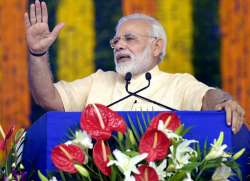Three years after the Bharatiya Janata Party (BJP) swept to power in Lok Sabha elections, Prime Minister Narendra Modi’s popularity has not waned, with nearly nine out of ten Indians holding a favourable view of PM Modi, says a survey conducted by US-based Pew Research Center.
According to the survey conducted among 2,464 respondents in India from Feb. 21 to March 10, 2017, nearly nine-in-ten Indians hold a favourable opinion of Modi, comparable to their view of him in 2015, after a year in office.
Roughly seven-in-ten say they have a very favourable view of the prime minister, again similar to public views in 2015.
The survey says that PM Modi’s unfazed popularity across the nation is a result of the public’s good feeling about the way things are going in India, the state of the domestic economy and his own stewardship of the country.
More than eight out of ten people believe that economic conditions are ‘good’, an assessment which is 19 percentage points higher than what was immediately before the 2014 general elections.
Adding to this, the share of adults who believe that the economy is ‘very good’ (30 per cent) has tripled in the past three years.
Overall, seven-in-ten Indians are now satisfied with the way things are going in the country. This positive assessment of India’s direction has nearly doubled since 2014, says the Pew survey.
Indians increasingly upbeat about Modi, the economy
and India’s direction
PM Modi’s growing popularity is also a result of the public satisfaction of how he has been handling issues like unemployment, corruption and rising prices.
According to the survey, BJP supporters have a more positive opinion on the economy than Congress supporters. But both groups are similarly satisfied with the direction of the country, despite a partisan gap of 18 points in 2016.
What is the reason behind PM Modi’s mass support?
Despite the Opposition trying to corner the Centre over demonetisation and Goods and Services Tax (GST) alleging that the nation’s economy has been severely affected with such reforms, the public support for PM Modi only seems to have increased.
It seems like PM Modi has been able to convince people that whatever the immediate consequences of such reforms, they will come up with constructive results in the long term.
Despite his critics opposing Modi’s emphasis on a cashless economy, e-governance and the JAM (Jan Dhan, Aadhaar and mobile), the technological initiatives are liked by people who trust technology more than political ideas.
Pew Research survey, released in October 2017, found that India is one of the three countries in the Asia Pacific where people support technocracy (a government comprising an elite of technical experts). "Asian-Pacific public generally back rule by experts, particularly people in Vietnam (67%), India (65%) and the Philippines (62%)," it said.
According to a survey carried out by global payment solutions company Visa, the inclination towards embracing digital is higher amongst those from a higher income household.
According to the survey, cash usage continues to decline marginally from around 33 per cent last year, to 31 per cent currently, and is expected to come down further to around 25 per cent over the next 12 months.
From 0.1 million to 76.96 million: Transactions through BHIM UPI see magical growth
Transactions through Unified Payments Interface or UPI have more than doubled in October to 76.9 million from 30.8 million in September, showed the data released by the National Payments Corporation of India (NPCI).
The total value of transactions also jumped to Rs 7,057 crore in October from Rs 5,325 crore in September.
According to the NPCI data, UPI transactions numbered 16.80 million in August, accounting for Rs 4,155 crore in value.
India makes ‘historic jump’ in World bank’s ‘ease of doing business’ index
India made a double-digit jump of 30 places to the 100th rank on World Bank’s ‘Ease of Doing Business’ index released in October 2017.
India, which was ranked 142nd when the Narendra Modi government took office in 2014 and 130th last year, is the only large country this year to have achieved such a significant shift on the back of reforms in taxation, construction permits, investor protection and bankruptcy resolution.
The World Bank said it is "one of the top 10 improvers in this year's assessment, having implemented reforms in 8 out of 10 'doing business' indicators." This is the first time India has broken into top 100 nations.
The survey showing the unaffected popularity of PM Modi across the nation is despite his shock decision of note ban, followed by a slew of economic reforms like the Insolvency and Bankruptcy Code.
Latest India News
